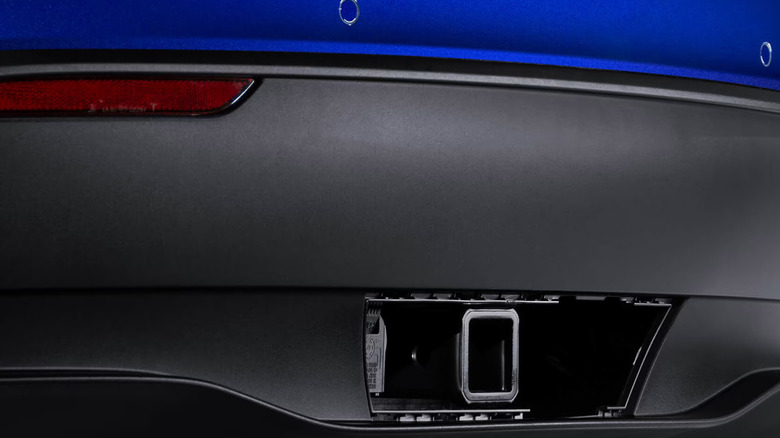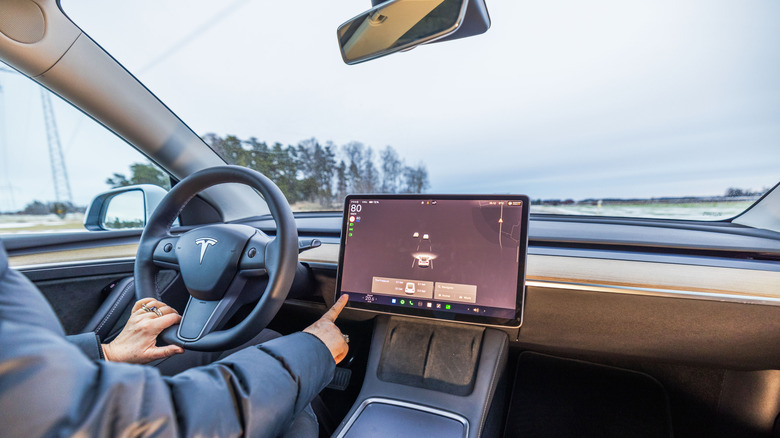
If you've got towing on your mind, the Tesla Model Y might not be your first pick, but it should be on the list. Tesla's crossover EV is capable of hauling more than you might expect, at least on paper. That number however, doesn't tell the whole story. Once you start digging into how Tesla's software has been set up for when a trailer is attached, it becomes clear that towing with a Model Y is a little more complicated than just slapping on a hitch and hitting the road.
The Model Y can tow up to 3,500 pounds when equipped with the official Tesla tow package, which includes a high-strength tow bar, 2-inch hitch receiver, 7-pin connector, a trailer harness, and the software package for Trailer Mode. This is a step up from the Model 3's optional 2,200-pound capacity. But the real challenge isn't the raw number. It's how the car behaves once you start towing.
 emirhankaramuk/Shutterstock
emirhankaramuk/Shutterstock
Tesla really wants you to opt for its $1,000 factory tow package, unlocking the Model Y's maximum towing capacity of 3,500 pounds and maximum tongue weight of 350 pounds. To keep things safe, Tesla limits certain driver-assistance features when towing. Trailer Mode, which activates when the trailer connector is plugged in, disables automatic steering interventions and adjusts cruise control to increase following distance. Side collision warnings stay active, but the car won't try to swerve around obstacles on its own. Automatic emergency braking force is reduced in Trailer Mode, Tesla warns, which means longer stopping distances.
They're sensible adjustments to the standard behavior, given the extra weight and length involved when towing, but only Tesla's tow package unlocks access to Trailer Mode. Aftermarket hitches are physically possible, but they won't trigger the in-car systems that are designed to manage towing behavior. That means you lose key safety features and potentially void your warranty if anything goes sideways. Oh, and if your trailer tips the scales over 1,650 pounds, Tesla wants you to hit up their service center for a four-pin pigtail adapter, then sort out your own aftermarket trailer brake controller. That's right, you're on your own for trailer brakes, because the Model Y doesn't come prepped to handle them out of the box.
 Alexander Shapovalov/Getty Images
Alexander Shapovalov/Getty Images
Towing with the Model Y isn't impossible, but it does require some planning. The car's drivetrain can absolutely handle small trailers and light campers, and the 3,500-pound limit is respectable. But the loss in range is no joke, especially if you're planning long road trips or heading into remote areas without Superchargers. The Model Y's highway driving range can drop as much as 26% from its claimed 310 EPA-estimate. Hitch a typical U-Haul utility trailer, and strap up cargo, and MotorTrend found highway range dropped to about 100 miles. This of course, will also depend on your exact chosen route and driving conditions on the day — and it's not like gas vehicles don't see an economy hit when towing — but don't be too hopeful.
If you're sticking to short hauls, know what you're towing, and understand the limitations, the Model Y can tow just fine. But don't expect it to replace a traditional tow rig, and don't count on Tesla making it easier with an aftermarket upgrade. The limited range is something to be particularly wary about, especially given the Cybertruck's rather questionable towing performance. As always with EVs and towing, the devil is in the software, and Tesla writes its own rules.














